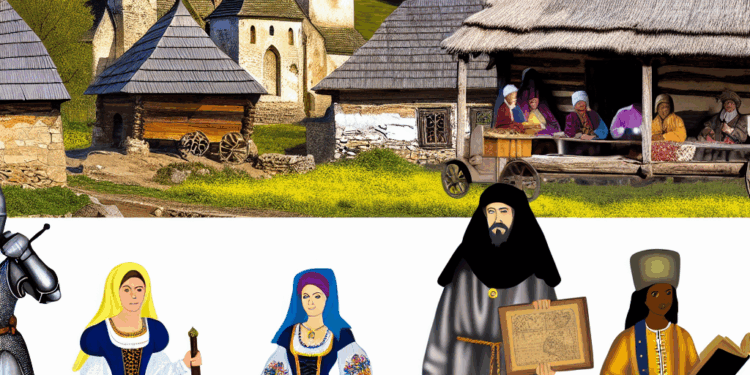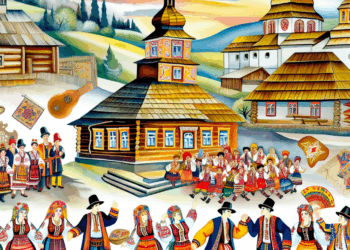Outstanding personality of Bukovyna: Vladimir Iosifovich Horak
Introduction
Bukovina, a region on the border of Eastern and Western Europe, has long attracted the attention of numerous cultural and historical figures. One of the brightest figures associated with the history of this region is Metropolitan Volodymyr Iosifovych Horak. His life and activity became significant both for Bukovyna itself and for Ukrainian culture as a whole.
Biography
Volodymyr Iosifovych Horak was born on 10 November 1940 in the village of Tarnavka (now the territory of Ukraine) in a family of simple peasants. He was a representative of Ukrainian nationality, which influenced his further activity. From an early age, Vladimir showed interest in religion and culture. In 1960 he graduated from the University of Chernivtsi and, despite certain difficulties associated with the Soviet regime, continued his education at the Moscow Theological Academy.
In 1965 he was appointed to the priesthood and a few years later to the position of archimandrite. In 1984 Vladimir Gorak became a bishop, and in 1990 he was elected Metropolitan of Bukovina and Dalmatia.
Major achievements
As a metropolitan, Vladimir Iosifovich Horak made many contributions to the development of the Orthodox Church in Bukovina. His activity was characterised by an active striving for the renewal of church life and the restoration of the original spiritual traditions. He was also involved in social ministry and actively supported youth, which made him popular among various segments of the population.
One of the most significant achievements of Metropolitan Horak was the restoration and opening of new churches in the region. He initiated the reconstruction of many destroyed churches and the construction of new buildings, which contributed to the revival of spiritual life. Special mention should be made of his efforts to involve the faithful in public affairs: Vladimir encouraged people to serve their nation and culture, which was reflected in the development of local parishes and church communities.
In addition, Metropolitan Horak actively supported cultural initiatives, including the organisation of festivals and holidays to promote Ukrainian culture. He initiated the creation of exhibitions featuring the works of local artists and folk artisans.
Impact on the region
Metropolitan Volodymyr Horak’s influence on Bukovina was multifaceted. Firstly, his activities contributed to the revival of Orthodoxy in the region. In the conditions of the post-war time, when depressive moods and atheism were dominant, the Metropolitan became a true guardian of spirituality and traditions. His calls for the revival of faith and love for his land resonated with many people.
Secondly, he contributed to the strengthening of Ukrainian identity. In the conditions of political reality, when the problem of national identity was particularly acute, the Metropolitan actively emphasised the importance of cultural heritage and linguistic identity. His sermons and public speeches often included references to Ukrainian culture, poetry and folklore, which contributed to the formation of a positive image of the Ukrainian people.
A third aspect of Metropolitan Horak’s influence on the region was his attention to social issues. He actively worked with the poor and disadvantaged, urging his flock not to ignore the needs of those around them. This moral stance further strengthened his authority in society and attracted people to his personal example.
The context of the era
Metropolitan Volodymyr Iosifovich Horak’s creative activity took place in the context of a difficult historical era, when Ukraine was under the strict control of the Soviet regime. Why exactly did his activity become so significant? Firstly, this was a time when traditional religion faced a threat from the atheist state. Under such conditions, the question of spirituality and faith became particularly relevant.
Secondly, the economic difficulties and social consequences of the post-war devastation had a significant impact on people, which often led to spiritual and moral crisis. Metropolitan Horak became a voice that called for a revival of trust, love and support, which was very much intertwined with social initiatives.
Finally, the 1980s were a time of revision of cultural and national policies in the USSR, which opened new horizons for Ukrainian culture. The introduction of glasnost and perestroika gave the Metropolitan the opportunity to speak about the problems the country was facing and the importance of national self-determination.
Conclusion
Metropolitan Volodymyr Iosifovych Horak left a deep trace in the culture and history of Bukovina. His activities as a religious leader, public figure and cultural activist made him a significant figure who united people and encouraged them to act in the name of their ideals and values.
In the memory of modern Bukovyna residents Horak remained not only a metropolitan, but also a symbol of spiritual renewal, which became an important prerequisite for further development of the region in independent Ukraine. His life and achievements are inspiring to this day, serving as an example for future generations striving to preserve and develop Ukrainian traditions and culture. With a heritage as rich as Volodymyr Iosifovich Horak’s, Bukovyna continues to be a place where history and culture intertwine, creating a unique context for modernity.








